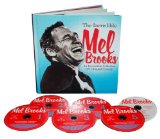| Reviews & Columns |
|
Reviews DVD TV on DVD Blu-ray 4K UHD International DVDs In Theaters Reviews by Studio Video Games Features Collector Series DVDs Easter Egg Database Interviews DVD Talk Radio Feature Articles Columns Anime Talk DVD Savant Horror DVDs The M.O.D. Squad Art House HD Talk Silent DVD
|
DVD Talk Forum |
|
|
| Resources |
|
DVD Price Search Customer Service #'s RCE Info Links |
|
Columns
|
|
|
Incredible Mel Brooks: An Irresistible Collection of Unhinged Comedy, The
An outstanding, enlightening tribute to a comedy legend
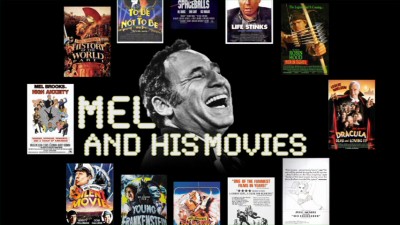
Reviewer's Bias*
Loves: Mel Brooks, Madeline Kahn, Learning Something New, Blazing Saddles, History of the World, Part I
Likes: High Anxiety, Robin Hood: Men in Tights
Dislikes: Not having new Brooks films to enjoy, lacking historical context
Hates: Not a damn thing here
The Collection
Way back in 2006, I had the opportunity to review The Mel Brooks Collection, an incomplete (thanks to licensing) set of the funnyman's films, including classics like /Blazing Saddles and Young Frankenstein. After winding my way through that release (and its inevitable Blu-Ray upgrade) I figured that would stand as the ultimate tribute to a man who has made some of the best comedies the world has ever seen. Little did I know that six years later Shout! Factory, hero to the fan of the niche and cult, would raise the ante and release The Incredible Mel Brooks: An Irresistible Collection of Unhinged Comedy a TRUE tribute to the legend, unbound by studio rights or structure.
Before anyone gets confused, this set doesn't contain any of his timeless feature films. This is an overview/retrospective of Brooks' work, going back to his days as a writer on television, right through to his latest film and Broadway work. As one of the few people who have walked this planet to achieve EGOT status (winning an Emmy, Grammy, Oscar and Tony), Brooks' career is long and impressive, and this set attempts to span all of it, and actually does a fine job of it, touching on basically everything at one point or another, while obviously focusing on his biggest achievements, namely the early run on television that established him, the famous "2,000 Year Old Man" bit that made him and partner/friend Carl Reiner stars and the films that cemented his place in pop-culture history. Along the way, little rarities are tossed in to round out the vision of Brooks' career, along with plenty of insight from the man himself, his contemporaries and fans.
With a set as diverse and deep as this, an overview won't quite cut it, so we'll go piece by piece to see what The Incredible Mel Brooks has to offer. On many of the elements, there are informative video introductions from Brooks himself (with a guest on one of them), which will be indicated by an asterisk, with a length of the intro. Note: The set is not presented chronologically.
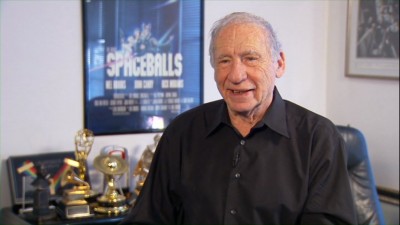
"The Hitler Rap" (1983)
(4:36) *(2:31)
Well, that was quick. Might as well get to Brooks' offensive material right off the bat, and this very '80s video featuring glamorous dancing girls sultrily singing "Seig heil," lithe S&M-inspired German soldiers slinking through and Mr. Tiny Moustache himself leading the way, is probably as offensive as it comes. Even so, the idea of a rapping Fuhrer is ridiculous, and by making it era-appropriate, it just becomes even funnier. That Brooks' rapping is so catchy is probably the most surprising and impressive thing about this song, which, aside from the lyrics, probably could have made it onto the radio at the time.
Mel Brooks and Dick Cavett Together Again (2010)
(56:20)
Frequent collaborators throughout their careers as interviewer and guest, Cavett and Brooks are a great team, as seen in this HBO special, which took place on stage in Beverly Hills. The two talk about classic stories from Brooks' life, covering topics like Alfred Hitchcock, Bob Hope, James Cagney having sex, the 2,000 Year Old Man, and Richard Pryor. It's an incredibly relaxed and therefore open and funny conversation, and even features a guest appearance by Carl Reiner, who's in the audience. On top of the 56-minute special, There's also an additional 12:30 of footage that didn't air, including a bit about Hope and Maurice Chevalier, which is both funny and quite dirty.
The Tracey Ullman Show: "Due Dilligence" (1990)
(10:08)
It's been a while since I've seen an episode of The Tracy Ullman Show, so what struck me immediately is how it doesn't feel like a sketch show. It's more of a slice of a sitcom, in this case, a sitcom about a down-on-his-luck producer (Brooks) who has to convince a big star (Ullman) to be in his last-chance movie. Featuring a lot of slapstick, including Brooks' troubles with a slippery office chair, and roles for the underappreciated Sam McMurray and Dan Castellaneta, it's a silly bit of work, that while not Brooks at his best, is a welcome flashback.
The Tonight Show Starring Johnny Carson
(12:54) *(1:25)
I have to confess, I've never been much of a fan of Johnny Carson. Yes, I was raised on his talk show, taking my feedings as a baby while he graced NBC, but I always found his show to be a bit stuffy and for him to be a bit smug (though his interactions with animal acts, much like Jimmy Fallon's, were always funny.) Here, with a true clown on his couch, he's much funnier, though they are definitely bits, rather than natural interactions, as Brooks shows off his Sinatra imitation, shares a story about Cary Grant and shows up in rags to promote his homelessness film Life Stinks. Either way, Brooks is funny in these clips, coming from across Carson's career as a host.
Peeping Times (1978)
(4:33) *(1:31)
Another Hitler bit from Brooks, this time from David Frost's TV newsmagazine parody. In this one, done with collaborators Bary Levinson and Rudy de Luca, Hitler gets a bit meta, as he's seen in some found home movies, hanging around with Eva Braun. Short and silly, it does the trick without too much excess.
Inside Danny Baker (1963)
(25:29)
This is probably the least-known of the material in this set, as it's a never-picked-up TV pilot from the early 1960s, but it's got quite a pedigree, with Brooks as the writer (working from source material by the creator of Shrek) and Love Story's Arthur Hiller behind the camera. The story of a kid with a big imagination looking to get into the world of modern art (with a cameo from Yankees legend Whitey Ford), it both feels like an early sitcom and doesn't, as it has a bit of a subversive sense of humor and a voice that's a bit more interesting than your usual black-and-white slice of suburbia. You're not likely to return to it often though.
"In The Beginning: The Caesar Years"
(46:26)
Though it is more about Sid Caesar and his Your Show of Shows, it was there that Brooks emerged into a top comedy writer, and looking at his career serves the dual-purpose of exploring Caesar's legacy and Brooks' development. This is probably the first time I've taken any real consideration of Caesar (who was more of a hack in my lifetime) but this special, which includes clips from a 1996 reunion of the writers, including Reiner, Neil Simon and Larry Gelbart, and scenes from the original series, gives a new appreciation for him and shines light on the foundation of Brooks' creations.
60 Minutes (2001)
(12:51)
Interviewed by Mike Wallace as his The Producers arrived on Broadway, Brooks turns the tables on the newsman and creates a memorable, hilarious interview, with a look at Brooks' writing process, rehearsals and his interaction with director Susan Stroman. It's a classic 60 Minutes piece and offers a delightful bit of fun as they talk about whether the now-iconic show will work on the musical stage.
American Comedy Awards (1991)
(2:35)
Probably the shortest entry in this set, this bit from a tribute to Reiner shows Brooks at the height of his powers, as he jokes about his Jewish background and bashes his pal. Also seen here are Rob Reiner, Kirstie Alley and a bearded Steve Martin. It's cute but basically inconsequential.
The Critic (1963)
(3:27) *(3:07)
The intro here is nearly as long as the film, an Oscar-winning animated short I was somehow unaware of until this point. It's presented here in solid form, so you can enjoy an obnoxious old man as he evaluates modern art forming in front of him. It's a fun, breezy little bit of experimental art, and should appeal to fans of Brooks' 2,000 Year Old Man especially.
I Thought I was Taller: A Short History of Mel Brooks (1981)
(43:41)
Created by the BBC as History of the World, Part I was coming to theaters, this is a strange little faux documentary, guided in essence by Brooks, and looking at his work and the film it was made to promote. It's a fun bit of self-deprecating silliness, as the crew struggles alongside Brooks to complete the documentary, as Brooks' career seems to be spiraling down around him. Well worth watching for fans of mockumentaries.
The Dick Cavett Show (1970/1972)
(20:53)
Whereas I never really enjoyed Carson, Cavett's long been a favorite of mine, as he's always seemed fun and cool, never taking things too seriously and quick and clever enough to keep up with the funniest in the business. But what's best about him is the way he respects the talent he's interviewing, letting them do their own thing, adding when he sees an opening, without stepping on their toes. With Brooks, he's at his best in this regard, as seen in the two segments included here.
Commercials
(4:57) *(1:40)
Directed by Brooks, with voiceover on some ads, these commercials for Frito-Lays and Bic Banana pens are amusing, mainly thanks to Brooks' voice, but they are pretty standard ads. They seem to be here mainly to show a slightly different side of Brooks' career.
Excavating the 2,000 Year Old Man (2012)
(43:54)
No retrospective of Brooks' career is complete without a look at the classic character he created with Reiner, and this PBS special, narrated by Chris Parnell, is a near-perfect evaluation of this bit. Featuring clips from various performances, and testimonial from fans like Richard Lewis, Garry Shandling, Bob Newhart and Paul Reiser, it's a beatifully crafted loveletter to a comedy classic, and an excellent way for newcomers to get to know the routine and appreciate its impact on an industry.
Bonus 2,000 Year Old Man Routines
(13:24)
The bit was never the same, and these three versions, one from an Art Fleming episode of Jeopardy!, one from the Colgate Comedy Hour and one from The Danny Thomas Variety Hour, serve as examples of how Brooks would take the same general structure and concept and tweak it for each re-telling, keeping it fresh and entertaining.
Mel's Television Debut (1951)
(2:35) *(2:55)
The only time where the intro is longer than the clip, this bit from Texaco Star Theater, features Brooks' first appearance on TV, but it's a bit hard to recognize him as the goofy mechanic. Part of the series' product placement, it's not the funniest bit ever, but it's certainly historic and appreciated for its inclusion.
An Audience with... Mel Brooks (1984)
(43:52) *(1:23)
Though presented as a Q&A with an audience, this British special is pretty obviously scripted out to the last detail, as Brooks chats with and about celebrity guests like Ronny Graham, Helen Mirren and Jonathan Pryce, in promotion of To Be or Not to Be. Though the show is awkwardly constructed in its conceit, it is funny, but it's most memorable for Brooks' duet with his wife Anne Bancroft on "Sweet Georgia Brown" in Polish.
Wogan (1984)
(16:02)
Terry Wogan's pretty much unkown to me, but it's pretty clear from this interview with Brooks that he's something like a British version of Cavett, able to keep pace with the super witty comic. The best part is when Brooks comes up with a system to help the director cut between cameras, and Wogan rolls right long with him into ridiculous territory.
Mad About You: The Penis (1997)
(22:38)
Like with Carson, I've never enjoyed Mad About You. I've always found the lead characters, played by Paul Reiser and Helen Hunt, to be incredibly self-absorbed and annoying, in much the same way I've viewed the Seinfeld crew. As a result, I never had the opportunity to enjoy Brooks' appearances on the show. He's quite enjoyable as Uncle Phil, but to have to suffer through the other characters is asking a lot. I just wondered who the competition was that allowed Brooks to win three Emmys in the role, which is fun, but not world-changing.
The Electric Company (1971-73)
(2:23)
These short animations show Brooks' character of the Blond-Haired Cartoon Man, who struggles with sentence construction. There's not a lot to the bit, but again, this seems to be more about being complete than great.
My Son, The Hero Trailer (1963)
(2:03)
Brooks' trailer for the Italian sword-and-sandals film is better remembered than the film itself, thanks to his work at subverting the genre to create a memorable trailer. I've always felt trailers could be more effective if they weren't just highlights from the film, and this trailer does a long way toward proving me right.
The David Susskind Show: How to Be a Jewish Son (1970)
(28:31)
Sitting down with Susskind, George Segal, David Steinberg, Brooks takes part in one of the most unusual panels seen on TV, as they discuss various aspects of being male and Jewish and the resulting relationship with their mothers. These clips, taken from the overall show, show Brooks' main contributions to the chat, and represent one of the strangest moments in TV talk history. It's not even always funny, with a few awkward moments between the panelists, but Brooks tries to keep things light.
Get Smart: Pilot (1965)
(25:34) *(10:46 with Buck Henry)
Sometimes it's easy to forget that Get Smart was developed by Brooks, since his films were such a bigger part of his career, but one look at this brilliantly hilarious show, starring the great Don Adams and Barbara Felton, will tell you quickly that it fits right in with his other output. The intro with Brooks and Henry is also quite enjoyable, as they talk about the credits issue that arose on the series, diffused with Brooks' trademark wit.
Hollywood Walk of Fame Induction (2012)
I've seen quite a few of these lately, and every time they feel cheesier and slightly creepier, in large part thanks to the Chamber of Commerce personnel running the show. The problem's been solved here, by going right to the tributes and unveiling, with Brooks' son Max, Reiner and Brooks himself speaking. As one would expect, you've got laughs and genuine emotion working together to create a good time.
When Things Were Rotten: "The French Dis-connection" (1975)
(25:42) *(1:36) Brooks' first shot at Sherwood Forest was this fun series full of the hallmarks of Brooks' most popular work. A fun cast (including Sid Caesar in a guest-starring role, along with Dick Van Patten, Dick Gautier and Bernie Koeppell) makes the broad comedy work, while you can see some of the groundwork being laid that would eventually pay off in Men in Tights. Though it didn't run very long, based on this episode, it seemed like a pretty entertaining show.
New Faces Sketch: "Of Fathers and Sons" (1952)
(7:22) *(3:22)
Featuring Paul Lynde, this is a bizarre little sketch making fun of the relationships between fathers and sons, taken from a movie based on the New Faces Broadway show. Over the top to a degree unseen in the rest of the collection, it's probably the wackiest Brooks has ever been, and as a result it's not as funny as his more understated work.
Free to Be...You and Me Sketch: "Boy Meets Girl" (1974)
(3:50) *(1:04) Essentially an afterschool special about tolerance and differences, this show based on Marlo Thomas' popular work is a bit too earnest to fit in with the rest of this collection, as Brooks and Thomas give voice to puppet babies discovering their genders. It's cutesy, and has a decent message, but it's just too message-based to enjoy fully.
Mel and His Movies (2012)
(2 hours, 19 minutes)
The gem of this set, this newly-produced five-part sit-down with Brooks (and occasionally de Luca) is spread across the five DVDs, and is a perfect way to revisit his films, as you get the word right from the man himself. Each part focuses on a couple of his movies, moving forward chronologically, until the fifth part, which features, alongside Robin Hood: Men in Tights, possibly his two least-regarded works, Life Stinks and Dracula: Dead and Loving It. Interestingly, aside from the first part, which looks at The Producers and The Twelve Chairs, the final entry is the longest. Brooks' has obvious affection for these movies, and his involvement in this set is clear in the attention paid to these productions.
With clips from the movies, mostly big musical moments, interspersed throughout, it's mainly just Brooks talking, telling old stories and sharing behind-the-scenes info, including his distaste for the corporatization of the movie business, a period of time he saw first-hand, and suffered because of. Though some of the info is well-known to those who have listened to previous Brooks' commentaries (not to mention several of the entries in this collection) having it all in one place (or rather five closely-situated places) is great, especially since some of these films were never getting the right treatment in terms of special features. It's hard to say what the best way to enjoy this special is, since fans will want to plow through all five parts in a sitting, but making your way through the set with pitstops on these pieces (which end each disc) gives them a nice sense of pacing.
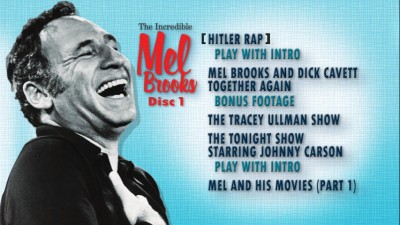
The DVDs
The five DVDs in this collection, along with a bonus CD, are housed in a square, hardcover 60-page book with thick two-sided envelope pages for the discs in the back. The book features essays from Leonard Maltin, Gene Wilder, writer Bruce Jay Friedman and critic Robert Brustein and full descriptions of all the content in the collection. The Maltin essay is quite good, while the Wilder and Friedman entries are a bit short, and the Brustein piece, which focuses on the Jewish elements in Brooks' works, was just less interesting. Take a look at the video below to get a better look.
The discs have static anamorphic widescreen menus that list the content you can watch. There are no audio options and no subtitles available.
The Quality
When you're talking about content that spans seven decades, you're going to have a spread of quality, and you get everything here from beautifully crisp anamorphic widescreen video to scratchy, grainy full-frame images, and everything in between. Nothing seems dramatically out of place, though nothing is surprisingly sharp (with the possible exception of the beautiful look of the Get Smart episode) and there seems to be no issues with compression artifacts.
The audio is basically the aural equivalent of the video, with tracks from across the spectrum, though nothing you'll hear will test your system's capabilities, largely because of the nature of the material. Overall, nothing here will leave you disappointed.
The Extras
In addition to the book and DVDs, there's a bonus CD of audio content to enjoy. Up first is a recording of Brooks made while he was at the New Schiool in 1947, as he worked on his diction. Though he just reads Keats' "The Eve of St. Agnes" and a Bible passage, you can hear the personality that would eventually make him a star. There are more rarities in the form of 22 minutes of clips from the 1960s The New Les Crane Show, where Brooks sat in as an immediate critic for the show's first episodes. It's an interesting idea, but when you don't see/here the bits he's reviewing, it has limited impact. His appearances on Open End with David Susskind and The Tonight Show with Johnny Carson from 1964 are more self-contained and therefore more entertaining, though his reparte with Carl Reiner on the 1965 The Celebrity Game is naturally much better, though the show itself doesn't sound like much fun. Far more entertaining are the commercials for Circus Nuts, where Cavett doesn't even try to hide his inability to not laugh at Brooks' historical routines.
Also included are eight songs from Brooks' films on this disc, which serve to prove just how good a songwriter Brooks is, even when you separate the, from the visuals. "The Inquisition" from History of the World, Part I may just be his best work in both comedy and catchiness. The songs on this disc are:
- "The Inquisition" (History of the World, Part I)
- "Springtime for Hitler" (The Producers)
- "Theme from Blazing Saddles"
- "I'm Tired" (Blazing Saddles)
- "Le Grand Frisson" (the French High Anxiety)
- "Men in Tights" (Robin Hood: Men in Tights)
- "It's Good to be the King" (History of the World, Part I)
- "Hope for the Best, Expect the Worst" (The Twelve Chairs)
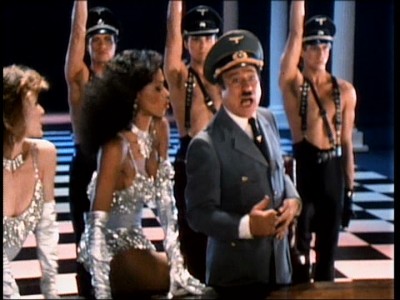
The Bottom Line
As a big fan of Brooks, this set was eye-opening, as you get to see work from across his career, plus a huge amount of self-analysis in the new entries, which offer insight you may not have heard before. The mix of new and old material and the excellent packaging make this a must for the shelves of any Brooks fan, as it's unlike anything in your collection.
Francis Rizzo III is a native Long Islander, where he works in academia. In his spare time, he enjoys watching hockey, writing and spending time with his wife, daughter and puppy.Follow him on Twitter
*The Reviewer's Bias section is an attempt to help readers use the review to its best effect. By knowing where the reviewer's biases lie on the film's subject matter, one can read the review with the right mindset.
|
| Popular Reviews |
| Sponsored Links |
|
|
| Sponsored Links |
|
|
| Release List | Reviews | Shop | Newsletter | Forum | DVD Giveaways | Blu-Ray | Advertise |
|
Copyright 2024 DVDTalk.com All Rights Reserved. Legal Info, Privacy Policy, Terms of Use,
Manage Preferences,
Your Privacy Choices | |||||||









